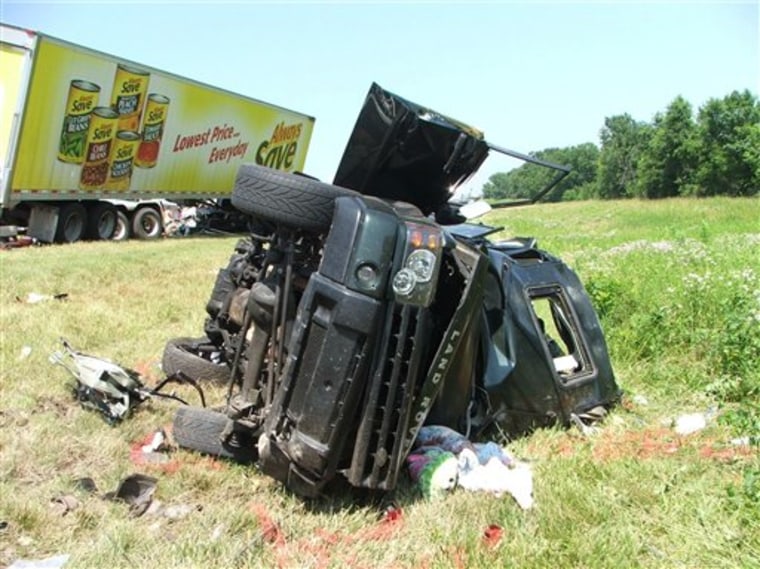A tractor-trailer truck driver who slammed his rig into a line of cars stopped on a stretch of Oklahoma highway last year, killing 10 people, was likely suffering from acute fatigue, investigators told the National Transportation Safety Board Tuesday.
Investigators told NTSB officials that driver Donald L. Creed, then 76, most likely had only five hours of sleep before starting his workday for Kansas City-based Associated Wholesale Grocers just after 3 a.m. on June 26, 2009. By the time he was 90 miles northeast of Tulsa, the accident site, he had been on the road for more than 10 hours.
Creed also suffered from sleep apnea, which causes abnormal pauses in breathing and can prevent restful sleep.
The accident was preceded by a minor collision, which had stopped traffic on Interstate 44 near Miami, Okla. Eastbound drivers cresting a rise could see the traffic jam ahead and began braking. However, Creed's 40,000-pound rig barreled ahead at nearly 70 mph, smashing into a Land Rover and knocking it into another car and then off the highway. The truck then rode over first one and then another car, dragging both vehicles under its wheels, before coming to a stop atop a minivan.
There is no evidence that Creed tried to brake or take evasive action before hitting the other cars, investigators said.
About 31 percent of all heavy truck accidents are due to driver fatigue, the board estimates.
The board first identified fatigue as a serious problem in heavy truck accidents 20 years ago but safety recommendations involving driver fatigue have gone unfulfilled for more than a decade.
The causes of driver fatigue are well-known, and it's long past time the trucking industry adopted measures to reduce the risk of accidents rather than wait for government regulators to force them to act, NTSB chairman Deborah Hersman said.
Investigators urged the board to recommend that the Federal Motor Carrier Safety Administration require trucking companies to employ fatigue risk management programs.
The agency is working on a model risk management program that is expected to be ready in about two years. However, investigators said there is no requirement that trucking companies adopt the program.
Investigators also said they'd like trucking companies to screen drivers for sleep apnea. They said drivers with sleep apnea aren't necessarily unsafe, but its important to ensure they are getting appropriate treatment for the disorder.
Creed has already pleaded guilty to 10 counts of negligent homicide, a misdemeanor in Oklahoma. He was sentenced last month to 30 days in jail and 10 years' probation.
Creed was not under the influence of alcohol or drugs, nor was he speeding — the speed limit on the turnpike is 75 mph. Prosecutors said his inattention caused the crash.
